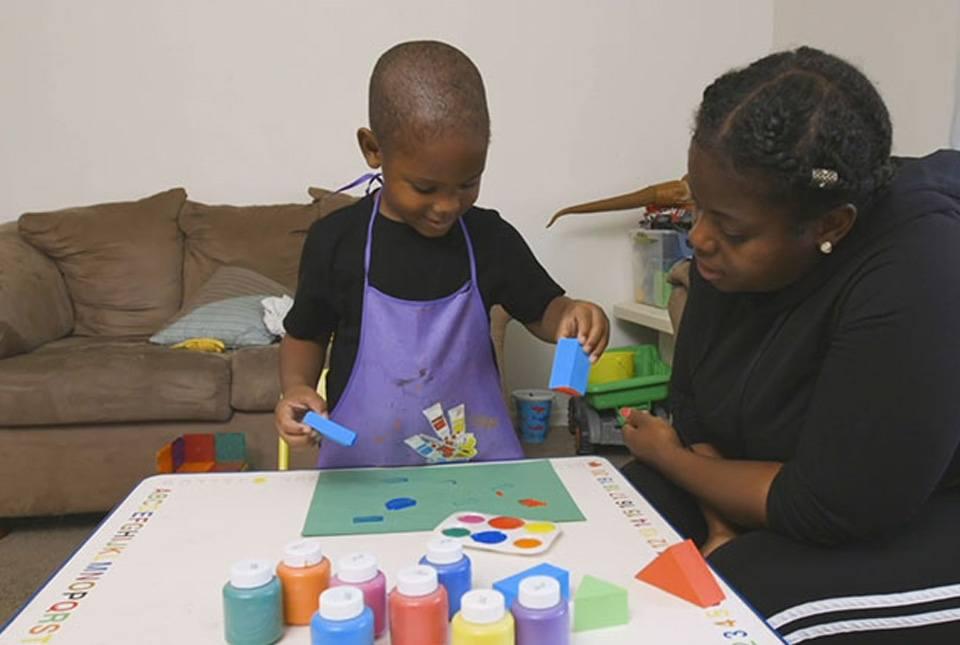Your Growing Child
Children are constantly growing. Help yours thrive!
Life as a caretaker is busy! Knowing the right things to do for your child’s health can help you adjust to your growing and changing child. Feeding, safe sleep, well visits, and more — kids need a lot as they develop. Here are some tips and important things to remember when caring for your little (or not so little) one.
Care for Your Child
Developmental Milestones
There are ways children speak, act, and learn by certain ages. These are called developmental milestones
Tracking your baby’s growth and encouraging development through play is something that can help your baby reach their full potential. Our Books Balls & Blocks (BBB) program is a free, fun family event where children can get an early childhood development screening. At the BBB program, children can take part in activities with their peers, while parents can observe, talk, and learn as everyone plays.
What should you expect as your child grows? The Nemours website
Want to learn more about developmental milestones? Visit the program page.
Developmental Screening
Quality Time Is Important
The first 1,000 days of a child’s life are a period of super-fast changes in their bodies, their brains, and their emotions. The one thing kids need most from the people who care for them is time. Spend time with them! Take time to find out about your child’s day. Our Quality Time 30 program has ideas for ways to spend quality time with your child. Reading together is one of the most important things you can do for your child. Delaware libraries
More Ways to Care for Your Child.
Don’t forget to take care of yourself.
The first step of taking care of your child is taking care of yourself. Let’s thrive and live a longer, healthier life. Here are a few tips to take care of you.
Don’t smoke.
If you do smoke or use other tobacco products, ask your doctor to help you quit. Visit the Delaware Tobacco Prevention and Control Program.
Eat a healthy diet.
Choose fruits, vegetables, whole grains, and lean sources of protein, such as fish and chicken. Limit foods high in trans fats and added sugar or sodium, like fast food.
Get moving.
Exercise can help you lower your risk of heart disease and stroke. It can also help improve your mood and be a great way to deal with stress. So aim to get 30 minutes of moderate-intensity exercise a day, for five days a week.
Limit alcohol.
If you choose to drink, do it in moderation. That means up to two drinks a day. Too much alcohol can increase your risk of high blood pressure, heart attack, stroke, and possibly cancer.
Don’t misuse drugs.
Did you know some vitamins and drugs can’t be taken together or can cause harm? Talk to your provider before you stop taking medication. If you or someone you care about is struggling with addiction, you are not alone. Help is available
to you regardless of insurance, from specially trained substance use disorder providers you can trust. Manage stress.
Stress can affect your overall health, so make sure you find ways to manage it by making time for yourself. Going for hikes, participating in a hobby, exercise, or meditation, and talking through issues are all great ways to reduce and manage stress.
Visit your health care provider.
Get your annual health check up. See your health care provider any time you are concerned or have symptoms you want checked out. Your health care provider can be your best ally for health education and disease prevention. Ask your doctor about preventive care such as cancer screenings, vaccinations, and other health evaluations. It’s also important to know your health history. Your family’s health history may reveal your risk for developing certain diseases in the future. Your provider can also help you get checked for STDs annually or when you have a new partner.
Looking for more ways to take care of yourself? We have a page to focus on your health, too!

We have programs to help.
If you need more help or guidance, you can also reach out to a Community Health Worker. Community Health Workers (CHWs) serve as a connection between health/social services and the community to simplify access to services and improve service delivery. CHWs aim to build individual and community capacity to improve health outcomes through a variety of activities such as outreach, health education, informal counseling, social support, linkages and referrals to health care, as well as community resources such as financial coaching or housing. Our Evidence-Based Home Visiting Program can also help you get one-on-one personalized help to care for your family.
Need Assistance?
Looking for formula or diapers? Interested in finding services that could build your child’s developmental skills? Help Me Grow at Delaware 2-1-1
Breaking Down Barriers
Improve health equity! Learn how your ZIP code or where you live can determine your quality of life. It’s the chance for everyone to make the choices to stay healthy. Learn about health equity and spread the word.


